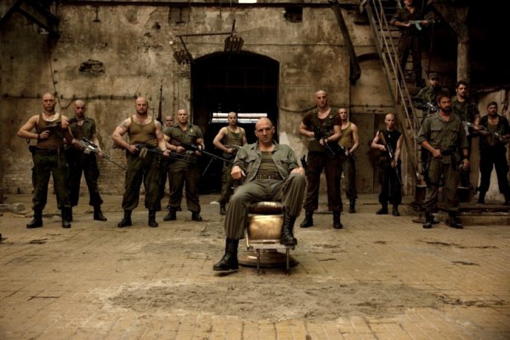By Meredith Alloway · January 24, 2012

Not in a while has a film done Shakespeare justice. The poor poet it botched, bungled and brutalized in screenplays on a regular basis. It’s embarrassing. Luckily, Ralph Fiennes decided to take matters in his own hands. He not only embodies one of the greatest, most complex Shakespearean characters in the canon, but he also directs the film. Coriolanus is stunning. It’s reckless and refined at the same time and its characters can blossom through the precision in which Fiennes operates. He preserves the text but also manages to pack in the action. He’s dusted off a play that so often goes unnoticed and made it hard to ignore.
Caius Martius Coriolanus (Ralph Fiennes) has just returned home to Rome from battle and once again proved his honor. His city greets him with open arms along with his wife Virgilia (Jessica Chastain) and his mother Volumnia (Vanessa Redgrave). We soon learn that Coriolanus has two goals in life: to protect his country and to please his mother. He has many advisors and many comrades, but in the end, his mother is boss.
Almost as soon as he escapes turmoil on the front, he returns to it in his political endeavors. He’s running for consul and the public is as fickle as ever. Coriolanus is glued to his policies, despite the guidance of his good friend Menenius, played by always-compelling Bryan Cox, After an appearance on a TV show where Coriolanus finally stands up to his vacillating followers saying, “You common cry of curs! whose breath I hate/As reek o' the rotten fens, whose loves I prize/ As the dead carcases of unburied men!” Almost immediately he’s betrayed by members of his party, and banished from the city.
Shakespearean drama always delivers a delicious antagonist, and this time Gerard Butler embodies Coriolanus’ archenemy, the formidable Tullus Aufidius. In the end, he’s the only other man Coriolanus feels is worthy of a fight, everyone else he can slaughter in a second. They’re not only a waste of bloodshed, but also a waste of his time. Aufidius is the leader of the Volscian army, who has fought to defend their city Corioles against Coriolanus’ men many times. As he wonders farther from his home, becoming more and more unrecognizable in both his physical demeanor and his once solid ideals, he runs into Aufidius. He joins them, offering his hand to defeat the very people who betrayed him, Rome. It’s the ultimate revenge, and once Coriolanus sets his mind on something, he can’t be stopped.
Fiennes put the play in the good hands of John Logan who has delivered wonderful work in the form of both theatre (Red) and cinema (Gladiator). The result is a script that moves at a rapid pace and slims off the fat that can be Shakespearean verse. It may read well on the stage, but can remain tedious on the screen. Logan gets to the heart of the story that is not just about war, but about ultimately about the corruption of mankind.
It’s no surprise that Shakespeare wrote the play much later in his life, because Coriolanus is perhaps one of his most depressing protagonists. He’s a man who fights incredibly hard to hold on to his ideals and his faith, but in the end he just cannot win. The world is vicious and its people are primitive. The play pokes a dirty finger into a wound every human can relate to: you can never get it right. The moment Coriolanus gives in to forgiveness and love, it’s thrown back in his face. He questions, “Would you have me
False to my nature? Rather say I play/ The man I am?” It depicts us all as tedious little ants laboring to build a hill that will inevitably be trampled by our own sinful fate. It’s a depressing thought.
But the film remains powerful because it doesn’t leave you feeling depressed. You leave inspired by the emotions, struggle and complexity each and every character possesses. You walk away with questions about the nature of mankind that so often are shied away from or ignored all together.
And then of course, Ms. Redgrave’s performance can’t go unmentioned. She is absolutely riveting. At 76 years old, she puts us all to shame. Her use of words so refreshingly reminds audiences that they are still very much tools to get what you want. In an age of texting and technology, words still a posses the same illustrious power.
Shakespeare’s back, at long last, the bar has been raised.